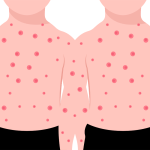During European Immunisation Week 2024 (21st-27th April), the European Centre for Disease Prevention and Control (ECDC) released data that show an “increase in cases of vaccine-preventable diseases”. Diseases such as measles and pertussis are demonstrating a marked increase across the region. The greatest risk is to young children, with ECDC emphasising the importance of “community immunity”.
A “disheartening” trend
Dr Andrea Ammon is the Director of ECDC and is concerned by the data.
“It is disheartening to see that despite decades of a well-documented safety and effectiveness track record of vaccines, countries in the EU/EEA and globally still face outbreaks of several vaccine-preventable diseases.”
Dr Ammon suggested that the “key actions” against diseases will be “achieving and maintaining high vaccination uptake, disease surveillance, and prompt response actions”.
“Vaccines have protected many generations, and we should ensure that this continues to be the case.”
Measles
ECDC reports that the increase in measles cases began in 2023, and the trend has continued in “several” EU Member States. Between March 2023 and the end of February 2024, “at least” 5770 measles cases were reported. This includes “at least” 5 deaths. In February 2024, 29 countries shared measles data with the ECDC. A total of 623 cases were reported by 21 countries. While case numbers decreased in comparison with the previous month, ECDC implies that this could be attributed to “reporting delays”.
Countries that reported the highest case counts were Austria (190), Romania (152), Italy (92), Germany (59), and France (38). The highest risk is faced by infants below one year of age, who are too young to be vaccinated. They should “therefore be protected by community immunity”.
“Measles spreads very easily, therefore, high vaccination coverage, of at least 95% of the population vaccinated with two doses of measles-containing vaccine, is essential to interrupt transmission.”
Pertussis
Pertussis cases have also been observed in greater numbers since mid-2023, and ECDC suggests that a “more than 10-fold increase in cases” is emerging in preliminary data from 2023 and 2024 compared to 2022 and 2021. Again, newborn babies and infants, who are too young to be “fully vaccinated”, are at an increased risk of severe disease or death.
“To best protect them, it is essential to ensure that all recommended pertussis-containing vaccines are given on time.”
Furthermore, vaccination during pregnancy can protect infants.
Identifying immunity gaps
ECDC encourages countries to apply “continuous efforts” to the identification of immunity gaps in the population. Individuals should check with healthcare providers to ensure that they are up to date with recommended vaccines and timelines, which vary by country.
“Additional work is needed to ensure no one is left behind, especially amongst vulnerable and underserved populations such as refugees, migrants, asylum seekers, and other groups.”
European Immunisation Week
European Immunisation Week is recognised as a “key occasion” to “underscore the importance of vaccination” for health and wellness at all stages of life. It is also a change to celebrate “one of the most remarkable achievements in public health of the 20th century”: vaccines.
“ECDC remains committed to supporting and enhancing national vaccination programmes, prioritising the principles of vaccine quality, safety, and efficacy, and ensuring timely and fair access for all.”
If European vaccine coverage and disease control are of interest, why not join us in Barcelona for the Congress this October, or subscribe to our newsletters for more updates?





